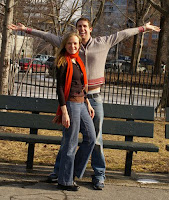Last night I finished teaching a 5-week online seminar for scholars in women’s studies on translating their ideas into book proposals for a trade (aka nonacademic) market. A shout out to all you fabulous participants! This group was great, and some book contracts are certain to follow.
One question a friend taking the course asked me toward the end was how I decided to bypass the traditional academic path and whether I’d recommend the path I’ve chosen instead to others currently situated in the academy.
I’ve never regretted my decision to bail on the academic job market as soon as I finished my PhD. It was tough telling my beloved dissertation advisor–though believe me, she was relieved when I eventually got the words out because I went through half a box of Kleenex before I could even speak so she must have thought I was about to reveal that I had some fatal disease. “Let a thousand flowers bloom†was her response, much to my relief. I imagine not all of them are like that.
After the degree, I spent a year as a Visiting Scholar at the Center for the Education of Women at the University of Michigan, then as a Research Fellow at the Barnard Center for Research on Women. I knew I wanted to write for a popular audience—that was why I’d left academe. I’d grown weary of writing prose that came to feel like a straight-jacket on me and was anxious to join the fray of young women then writing about feminism. Katie Roiphe’s The Morning After, you could say, was my motivation. I wanted to take her and others on in print, and in a way that I, too, could be heard.
So I tried to become a freelance writer. I was in the ridiculously lucky position of having funding to do this (not something I would encourage anyone to count on – long story). Though it may sound idyllic, I hated it. Lack of structure, lack of accountability (I didn’t have an agent or a publisher yet), and lack of a community doing the same thing I was doing (I was new to NYC at the time) made me feel extremely isolated and I sunk. When you start out freelancing for magazines, you spend 90 percent of your time pitching editors and 10 percent writing actual articles. Launching the web-journal The Scholar and Feminist Online at Barnard during this time saved me. But I did manage to write an article for Psychology Today that got me the attention of an agent, and ultimately, that connection changed my life.
Two books later and with the support of an incredible writers’ group, the Invisible Institute, behind me, I’m still not writing full-time, nor would I choose to be. I need structure and colleagues like I need oxygen. I learned this when I went to work as a projects director at the National Council for Research on Women, after my Barnard gig was up. I worked for NCRW 4 days a week and wrote on the 5th. I wrote early mornings before work and weekends. This carried me through the completion of my first book (a co-edited anthology) and a draft of my second (Sisterhood, Interrupted). I left my staff position at NCRW in July, because I was ready to shift the balance.
Writing now makes up about 50 percent of my week. The other 50 percent I spend consulting and working on special projects for women’s research and policy centers. I’m freelance again, but this time, it works because I’m working with organizations and I get to go to office places. Believe me, this makes a huge difference. After having suffered the isolation of writing a dissertation and then some painful years trying to write freelance full-time, I still get turned on by things like staff meetings and supply closets.
Would I recommend the path I’ve taken? I admire and have huge respect for my friends pursuing academic careers and would never say one route is better than another. It’s more a matter of what perch you want to offer your contribution from, and in what voice. And, most importantly, your tolerance or capacity for risk. Leaving a stable job with benefits is risky and not for the faint of heart. I personally couldn’t have done it without support from family and, for a while, a husband.
But now here’s my plug: Feminist thinkers trained in the academy are so often experts at producing trenchant cultural analysis. We need this, and we need this stuff in public venues. The under-representation of women’s voices and the lack of women- and girl-centered topics in mainstream media coverage is nothing short of appalling. Feminist scholars have this incredible opportunity to frame popular debate. Can they do it from academic perches? Possible. But not easy. Which is why the National Women’s Studies Association and I created this course (“Making It Pop: Translating Your Ideas for Tradeâ€)—to help those who have committed themselves to academic careers and academic contributions also consider crossing over and learn to write for trade. The Woodhull Institute is another organization helping, and encouraging, women scholars to write for popular audiences. They offer amazing writers’ retreats, which I highly recommend. And then there’s Katie Orenstein (see previous post!), out there teaching women experts of all stripes and fields to write op-eds.
It’s a propitious time to be thinking about popularizing your thoughts and your writing if you are a feminist scholar because of these resources and trainings that have recently emerged. Stay tuned for more from me, too….The NWSA course may be just the beginning.



